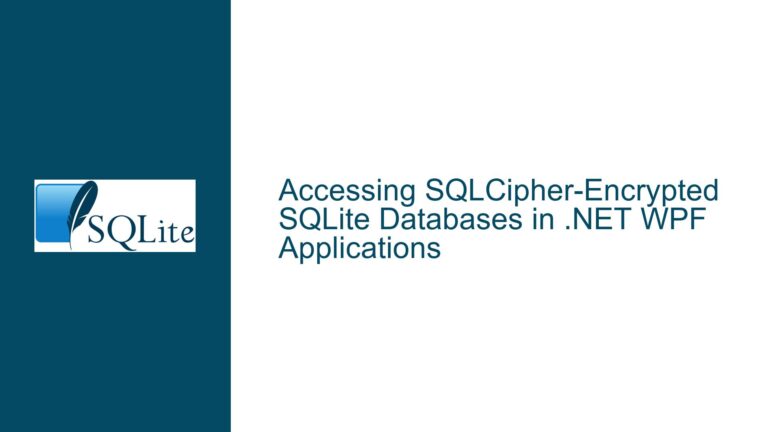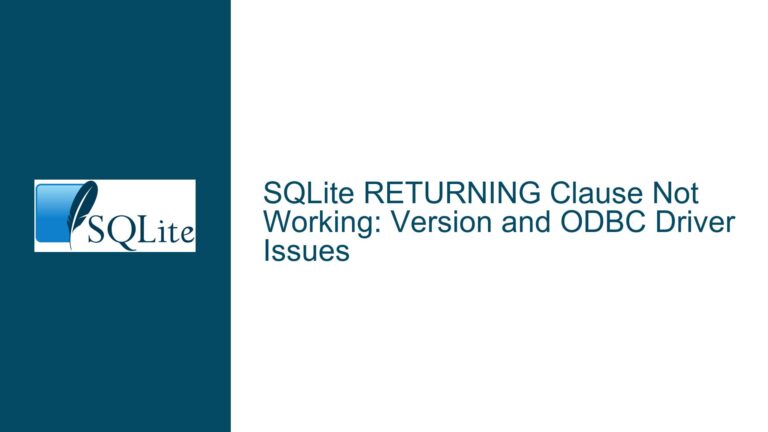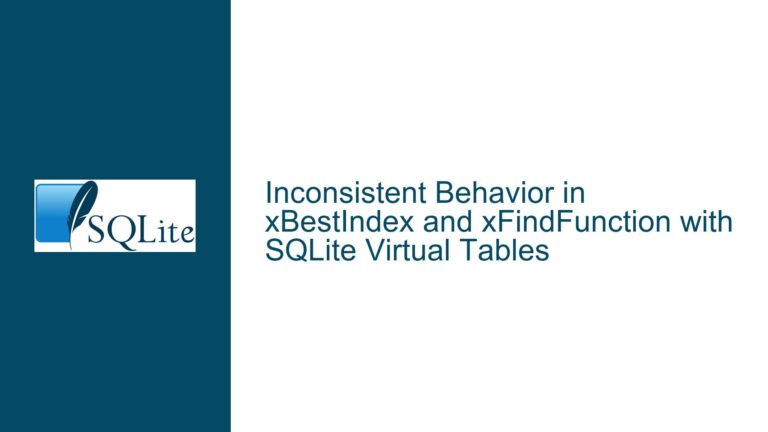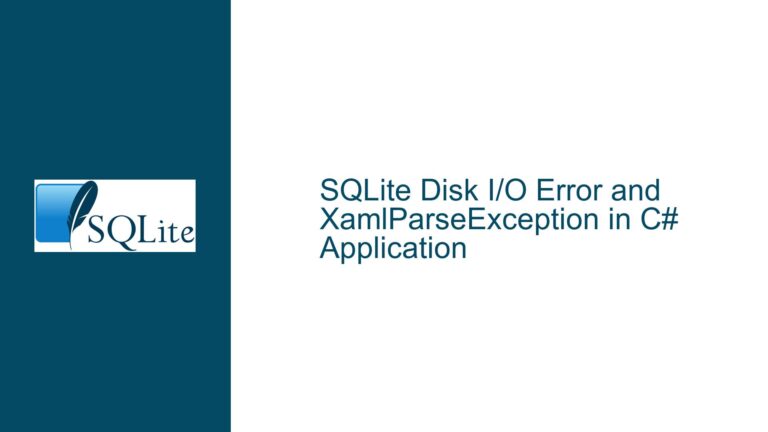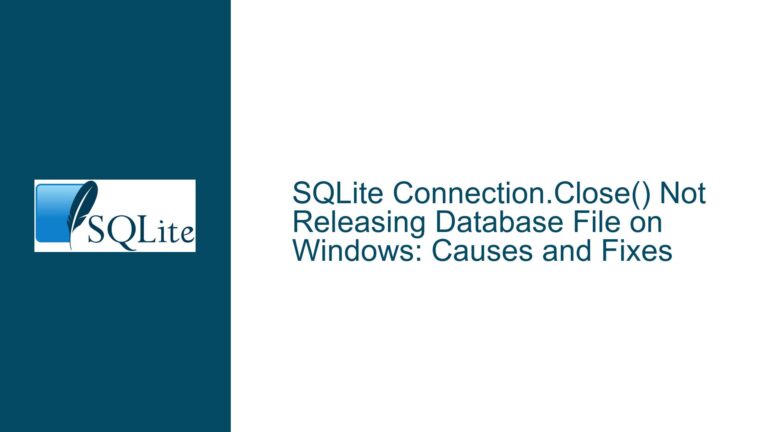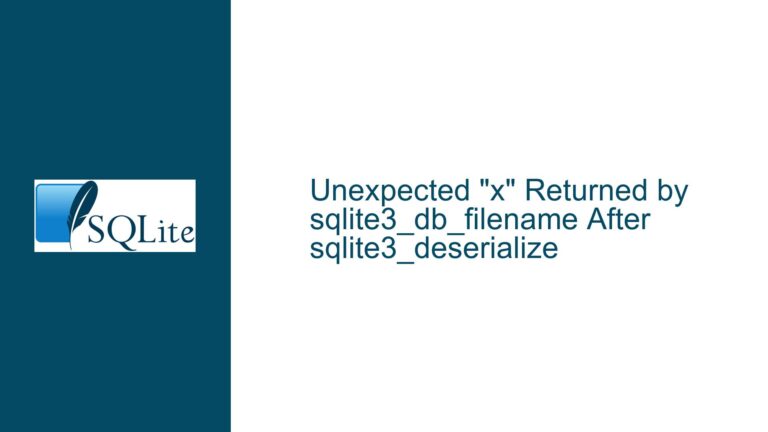NULL Pointer Access in sqlite3MemdbInit with SQLITE_OS_OTHER and SQLITE_ENABLE_DESERIALIZE
Issue Overview: NULL Pointer Access in sqlite3MemdbInit During Memory Database Initialization
When building SQLite version 3.35.4 for an embedded system without an operating system, using the amalgamation (sqlite3.c) and defining SQLITE_OS_OTHER and SQLITE_ENABLE_DESERIALIZE, a critical issue arises during the initialization of an in-memory database. Specifically, the application crashes due to a NULL pointer access in the sqlite3MemdbInit function. This occurs when attempting to open an in-memory database using sqlite3_open(":memory:", &db).
The root of the problem lies in the sqlite3MemdbInit function, which attempts to access the szOsFile member of a sqlite3_vfs structure before the VFS (Virtual File System) is registered. The sqlite3_vfs_find(0) call returns NULL because no VFS has been registered at this point, leading to a dereference of a NULL pointer. A similar issue is observed in the memdbRandomness function, where the ORIGVFS(pVfs) macro attempts to dereference a NULL pAppData pointer.
These issues highlight a fundamental assumption in the SQLite codebase: that a default VFS is always available. However, when building with SQLITE_OS_OTHER, this assumption is invalid because the default VFS is not automatically registered. This creates a problematic dependency chain where the memory database VFS (memdb_vfs) relies on a lower-level VFS for certain operations, such as file size determination and randomness generation.
Possible Causes: Unregistered VFS and Dependency on Default VFS Functionality
The NULL pointer access in sqlite3MemdbInit and memdbRandomness stems from two primary causes:
Unregistered VFS at Initialization Time
Thesqlite3MemdbInitfunction attempts to find a lower-level VFS usingsqlite3_vfs_find(0)before any VFS has been registered. This is a logical error because the memory database VFS (memdb_vfs) is designed to inherit functionality from a lower-level VFS, such as the default VFS provided by SQLite. When no VFS is registered,sqlite3_vfs_find(0)returns NULL, leading to a crash when trying to access theszOsFilemember.Dependency on Default VFS Functionality
The memory database VFS (memdb_vfs) relies on a lower-level VFS for certain operations, such as determining the size of the OS file structure (szOsFile) and generating randomness (xRandomness). This dependency is not explicitly documented in the SQLite API, leading to confusion when building SQLite withSQLITE_OS_OTHER. In such cases, the developer is responsible for providing a custom VFS or ensuring that a default VFS is registered before using the memory database functionality.Incomplete Handling of NULL Pointers
Thesqlite3MemdbInitandmemdbRandomnessfunctions do not include checks for NULL pointers, which would prevent crashes in cases where no VFS is registered. This is a design oversight that becomes apparent when using SQLite in environments where the default VFS is not automatically available.Misuse of SQLITE_OS_OTHER and SQLITE_ENABLE_DESERIALIZE
The combination ofSQLITE_OS_OTHERandSQLITE_ENABLE_DESERIALIZEcomplicates the initialization process. TheSQLITE_OS_OTHERflag indicates that the application is responsible for providing a custom VFS, whileSQLITE_ENABLE_DESERIALIZEenables the deserialization API, which may implicitly rely on a VFS for certain operations. This combination creates a scenario where the memory database VFS is used before a VFS is registered, leading to the observed crashes.
Troubleshooting Steps, Solutions & Fixes: Handling NULL Pointers and Registering a Custom VFS
To resolve the NULL pointer access issue in sqlite3MemdbInit and memdbRandomness, the following steps and solutions can be implemented:
Add NULL Pointer Checks in sqlite3MemdbInit and memdbRandomness
The most immediate fix is to add NULL pointer checks in the affected functions. Forsqlite3MemdbInit, theszOsFileassignment should be modified as follows:int sz = pLower ? pLower->szOsFile : 0;This ensures that the function does not crash when
pLoweris NULL. Similarly, thememdbRandomnessfunction should be updated to handle NULL pointers:return ORIGVFS(pVfs) ? ORIGVFS(pVfs)->xRandomness(ORIGVFS(pVfs), nByte, zBufOut) : 0;These changes prevent crashes but do not address the underlying issue of missing VFS functionality.
Register a Custom VFS Before Using Memory Databases
When building SQLite withSQLITE_OS_OTHER, it is essential to register a custom VFS before using any database functionality, including in-memory databases. This can be done by implementing a minimal VFS that provides the required functionality, such asszOsFileandxRandomness. For example:static int customRandomness(sqlite3_vfs *pVfs, int nByte, char *zBufOut) { // Implement a custom randomness generator return 0; } static int customOpen(sqlite3_vfs *pVfs, const char *zName, sqlite3_file *pFile, int flags, int *pOutFlags) { // Implement a custom file open function return SQLITE_OK; } sqlite3_vfs customVfs = { 1, // iVersion sizeof(sqlite3_file), // szOsFile 1024, // mxPathname 0, // pNext "custom_vfs", // zName 0, // pAppData customOpen, // xOpen 0, // xDelete 0, // xAccess 0, // xFullPathname 0, // xDlOpen 0, // xDlError 0, // xDlSym 0, // xDlClose customRandomness, // xRandomness 0, // xSleep 0, // xCurrentTime 0, // xGetLastError 0, // xCurrentTimeInt64 0 // xSetSystemCall }; sqlite3_vfs_register(&customVfs, 1);This custom VFS provides the minimum functionality required for the memory database VFS to operate correctly.
Modify SQLite Build Configuration
If the use ofSQLITE_OS_OTHERis not strictly necessary, consider building SQLite without this flag. This allows SQLite to use its default VFS, which avoids the NULL pointer access issue. Alternatively, ifSQLITE_OS_OTHERis required, ensure that the build configuration includes a default VFS or that a custom VFS is registered before any database operations are performed.Review SQLITE_ENABLE_DESERIALIZE Usage
TheSQLITE_ENABLE_DESERIALIZEflag enables the deserialization API, which may implicitly rely on a VFS for certain operations. If deserialization is not required, consider disabling this flag to simplify the initialization process. If deserialization is required, ensure that a VFS is registered before using the deserialization API.Test and Validate the Fixes
After implementing the above changes, thoroughly test the application to ensure that the NULL pointer access issue is resolved and that the memory database functionality works as expected. This includes testing edge cases, such as opening multiple in-memory databases and using the deserialization API.
By following these steps, developers can resolve the NULL pointer access issue in sqlite3MemdbInit and memdbRandomness while ensuring that SQLite operates correctly in embedded environments with SQLITE_OS_OTHER and SQLITE_ENABLE_DESERIALIZE.

